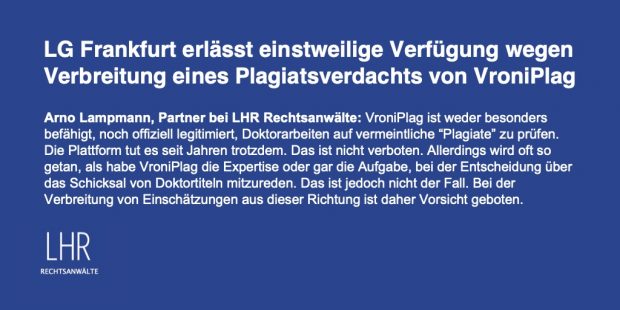
Suad Kamardeen on Unsplash
Public pillorying is taking on new dimensions in the digitalized media age. It must be handled with the appropriate sensitivity. A suspicion is a suspicion – nothing more.
The Regional Court of Frankfurt has recently prohibited a newspaper from disseminating a suspected plagiarism originating from VroniPlag (LG Frankfurt, Beschluss v. 28.7.2020, Az. 2-34 O 49/20).
The internet has many facets. One of them is that it is possible for practically anyone and everyone to cause quite a lot of damage with relatively little effort. This is the case, for example, when people are dragged into the mud virtually. This can have a concrete impact on real life, even to the point of destroying livelihoods. On the other hand, the internet also offers the opportunity to shed light on grievances and misconduct.
VroniPlag: Celebrities in focus
Somewhere in between lies VroniPlag. The platform has set itself the goal of uncovering plagiarism in academic theses. The focus is particularly on the dissertations of celebrities. VroniPlag scours the texts for citations that are not marked accordingly and that the author has appropriated. If this dishonest approach can be proven conspicuously often, there is a reason to revoke the doctorate. This, in turn, is not within the authority of VroniPlag, but is the task of the university committees responsible for the doctoral procedure.
Nevertheless, people often act as if the academic disclosure platform has the last word, so to speak. A suspicion of plagiarism is quickly elevated to a fact, especially in the media. Of course, such cases are interesting for the media and – when it comes to elected officials or public figures – also socially relevant. It is therefore perfectly permissible and appropriate to report on them.
Suspicious activity reporting: Clear rules for the protection of personal rights
The crux of the matter, however, is that reporting on people accused by VroniPlag of working unfairly is suspicious activity reporting under media law. This means that the rules of suspicion reporting must be observed when writing the article or broadcast. Representatives of the press should inform themselves well in advance about what this means. What works – and what doesn’t – is clearly explained here.
Frankfurt Regional Court issues temporary injunction against newspaper
Everyone is obliged to handle suspicions sensitively, but especially the media. For example, the Regional Court of Frankfurt a. M. prohibited a newspaper from reporting on VroniPlag’s suspected plagiarism in an identifying manner (LG Frankfurt, Beschluss v. 28.7.2020, Az. 2-34 O 49/20). A headline stating that the academic had “copied her doctoral thesis” was inadmissible solely on the basis of the suspicion that may have arisen from the VroniPlag analysis.
Furthermore, the wording “unmasking of her doctorate as plagiarism” gives the impression that the withdrawal of the doctorate by the university in question is already certain, which is not the case. This is therefore not reporting on suspicion, but reporting on facts. And this violates personal rights because it leaves the person with hardly any chance of restoring their reputation in public perception and opinion, even if their innocence has been legally proven.
In the event of a breach, a fine of up to €250,000 or even imprisonment may be imposed. The amount in dispute was set at € 20,000 by the regional court. The decision is not legally binding and can be appealed by the newspaper. In addition, proceedings on the merits are also possible.
The media’s approach to VroniPlag
In principle, every media professional must ask themselves the question of whether it is even permissible to report on significant aspects of personality (including professional qualifications and academic degrees) on the basis of “investigation results” from an Internet platform that is not officially legitimized by anything. Even if this is done in the mode of suspicion reporting, the question of relevance beyond gloating must always be asked beforehand. Because something always sticks. You have to know that before you make a headline that not only increases sales figures and clicks, but also carries the risk of affecting a person’s existence.
It must be clear that the hunting instinct has caused self-proclaimed plagiarism hunters to overshoot the mark on many occasions and voice suspicions that ultimately proved to be unfounded or at least did not lead to the withdrawal of the doctorate; prominent personalities who can still be quickly linked to plagiarism allegations today – for example via a search engine – are Ursula von der Leyen and Franziska Giffey.
It is difficult for the inexperienced newspaper reader and the not always one hundred percent attentive radio listener to differentiate between scientific ethical shortcomings and an offense that justifies the withdrawal of the title. Scientific work is not part of everyday life for every recipient. And the more complex the subject matter, the more important the information and orientation function of the media becomes. The impetus of the reports about people targeted by VroniPlag often brings the complete opposite of the media’s mission to the public: disinformation and misdirection through prejudgement.
Lawyer Arno Lampmann from the law firm LHR:
VroniPlag is neither particularly qualified nor officially authorized to check doctoral theses for alleged “plagiarism”. Nevertheless, the platform has been doing this for years. This is not prohibited. However, it is often pretended that VroniPlag has the expertise or even the task of having a say in deciding the fate of doctoral theses. However, this is not the case. Caution is therefore advised when disseminating assessments from this direction.
(Disclosure: Our law firm represented the applicant side).
